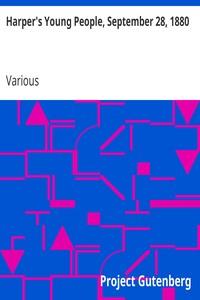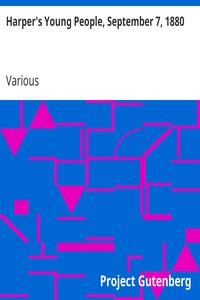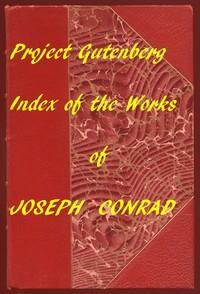Read this ebook for free! No credit card needed, absolutely nothing to pay.
Words: 19069 in 10 pages
This is an ebook sharing website. You can read the uploaded ebooks for free here. No credit cards needed, nothing to pay. If you want to own a digital copy of the ebook, or want to read offline with your favorite ebook-reader, then you can choose to buy and download the ebook.


: Harper's Young People September 28 1880 An Illustrated Weekly by Various - Children's periodicals American Harper's Young People
n for the next night, but never a 'coon was in them in the morning. The cunning fellows evidently considered the place too dangerous, and chose another entrance. Anyway, the corn was still going away fast. Frank feared that he wouldn't have enough to fill his contract with the canning factory unless the family in the house, or the other family in the woods, left off eating. Something must be done. At length Frank bought a dog. He made a nice kennel for him in the middle of the corn field, and tied him there at night. Just after Frank had fallen into a sound sleep the dog woke him up with his barking. Frank went out, but could find nothing. The dog woke him twice more that night, but he didn't trouble himself to leave his bed again. In the morning he found that the 'coons had destroyed as much corn as before, but it was all about the edges. The next night they ventured a little nearer the kennel. The following night the dog was left in the kennel loose. Probably when the 'coons came he made a charge upon them, and they turned upon him and drove him away, for he was only a little young one. He took refuge in the wood-house, where he barked furiously for an hour or more, and then in occasional brief spells all the night--whenever he woke enough to remember the 'coons. After this Frank gave up the defense of the corn, but began to gather it nightly as fast as the ears were sufficiently full. At length he cut the corn and took it into the barn, excepting a single bunch. About this bunch he sunk traps in the ground, and threw hay-seed over them, and placed nice ears of sweet-corn beside them. The next morning he had another 'coon. The other trap was sprung also, but it held nothing but a little tuft of long gray fur. That sly fellow had again sat down on the trencher. From this time the 'coons troubled Frank's corn no more, having found other fields where there was more corn and fewer traps. Frank's final conflict with the 'coons was late in the autumn, when the leaves were nearly gone from the trees, and the ripe beech-nuts were beginning to drop. He had fired all his ammunition away at gray squirrels the day before, except a little powder; but a meeting of crows in the adjoining woods incited his sporting proclivities, and he loaded his gun, putting in peas for shot, and started for the locality of the noisy birds. They cawed a little louder when they discovered the intruder, then began in a straggling manner to fly away. So when Frank arrived at the scene of the meeting it had adjourned. Looking about in the trees to see if by chance a single crow might still be lingering, a slight movement in a tall maple met his eye.
"Biggest gray squirrel ever I saw," muttered the boy, raising his gun. The position was not a good one for a shot, as the head, which had been thrust out over a large branch close to the trunk was now withdrawn, so that only the end of the nose was visible. Close beside this branch was another, and between the two a large surface of gray fur was exposed.
"I'll send him some peas for dinner," thought Frank, and fired. He heard the peas rattle against the hard bark of the tree, but no gray squirrel came down or went up that he could see. When the smoke cleared away, a black nose was thrust out over the branch, and two keen eyes were visible, peering down at the sportsman, as much as to say, "I like peas for dinner, little boy, but don't take 'em that way."
"That's no squirrel," thought Frank. "I believe it's a 'coon--sure as a gun. And I haven't got a thing to shoot him with."
He thought of putting his knife into his gun for a bullet, but it proved too large. Then he looked for some coarse gravel, but did not find any. Feeling in all his pockets, his fingers clutched a board nail.
"Ah, that's the thing! We'll see, Mr. 'Coon, if you care any more for board nails than you do for peas."
Loading his gun again, he dropped in the nail instead of a knife for a bullet. He took careful aim again at the spot of fur between the branches, and fired. The 'coon was more than surprised this time, and he certainly forgot to look before he leaped, or he never would have sprung right out ten feet from the tree, with nothing between him and the ground, thirty or forty feet below. He struck all rounded up in a bunch, like a big ball, bouncing up two or three feet from the ground. Frank started toward the animal, thinking, "Well, that fall's knocked the life out of him."
He never was more mistaken. When he stepped toward him, the 'coon got upon his feet at once, and offered battle. Frank now used his gun in another manner, seizing it by the barrel, and turning it into a war club. There ensued some lively dodging on the part of the 'coon; but at length he was hit slightly, when he turned and ran for the nearest tree. This happened to be a beech, in whose hard, smooth bark his claws would not hold. He slipped down, and as Frank came up, turned and made a dash for the boy's legs. Frank met him with a blow of the gun on the head, at which the 'coon dropped down, apparently lifeless. Another such blow would have finished him; but Frank was unwilling to give it, for the last one had cracked his gun-stock. So he shouldered the gun, took the 'coon up by the hinder legs, and started for home. Before he got there the 'coon had come to his senses again, and made Frank pretty lively work to keep his own legs safe. As soon as he could find a good stake Frank dropped his dangerous burden, and before the 'coon could run away, he was stunned by a blow of the stake.
With this victory the war between Frank and the 'coons ended for the season. He had been obliged to buy some corn of a neighbor in order to fill his contract with the canning factory; but the 'coon-skins sold for enough to make up the money.
WHO WAS PAUL GRAYSON?
BY JOHN HABBERTON,
MUSIC AND MANNERS.
Free books android app tbrJar TBR JAR Read Free books online gutenberg
More posts by @FreeBooks

: With the Night Mail: A Story of 2000 A.D. (Together with extracts from the comtemporary magazine in which it appeared) by Kipling Rudyard Leyendecker Frank X Illustrator Reuterdahl Henry Illustrator - Science fiction; Aeronautics Fiction Science Fiction


: Harper's Young People September 7 1880 An Illustrated Weekly by Various - Children's periodicals American Harper's Young People






